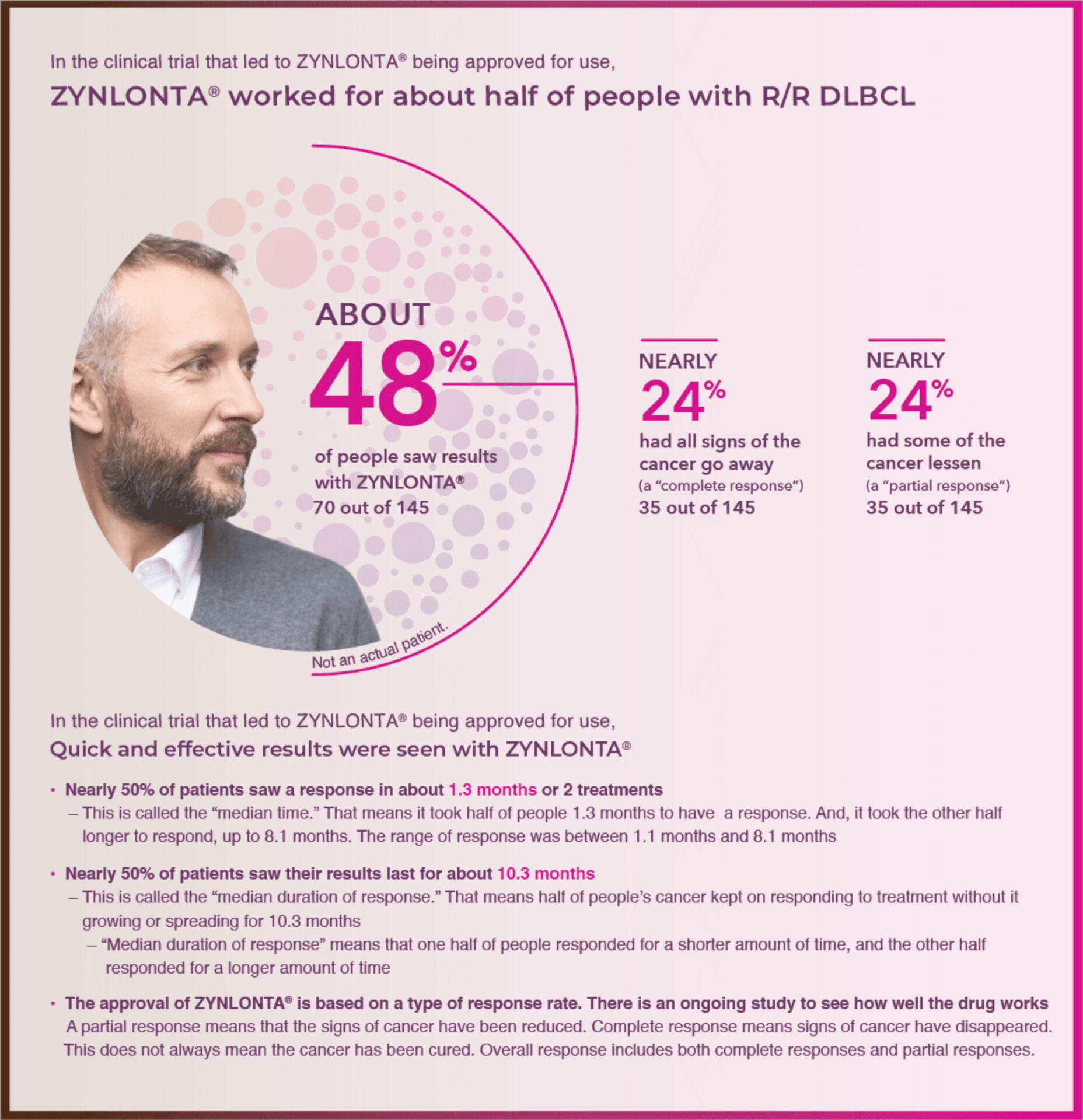ZYNLONTA® was specifically studied in adults who needed their next DLBCL therapy option after trying 2 or more past therapies
ZYNLONTA® is for people living with…
Relapsed cancer:
The cancer came back after past therapies worked
OR
Refractory cancer:
Therapy/therapies have not worked or no longer work
Ask your doctor if ZYNLONTA® is right for you.
ZYNLONTA® was effective for many people who had past R/R DLBCL therapies
The ZYNLONTA® clinical trial included people who had already received a variety of DLBCL therapies, including:
-

-
 RITUXAN® (rituximab)
RITUXAN® (rituximab)RITUXAN® (rituximab) — A drug used alone or with other drugs to treat certain types of B-cell non-Hodgkin lymphoma, and some leukemias. Rituximab is also being studied in the treatment of other conditions and types of cancer. Rituximab binds to a protein called CD20, which is found on B-cells (a type of white blood cell) and some types of cancer cells. This may help the immune system kill cancer cells. Rituximab is a type of monoclonal antibody (also called mAb).
-
 CAR-T therapy
CAR-T therapyCAR-T therapy — A type of treatment in which a person’s T cells (a type of immune system cell) are changed in a laboratory so they will attack cancer cells. T cells are taken from a person’s blood. Then, the gene for a special receptor, called a chimeric antigen receptor (CAR), that binds to a certain protein on the person’s cancer cells is added to the T cells. Large numbers of the CAR T cells are grown in the laboratory and given to the person by infusion. CAR T-cell therapy is used to treat certain blood cancers, and it is being studied in the treatment of other types of cancer. Also called chimeric antigen receptor T-cell therapy.
-
 Stem cell transplant
Stem cell transplantStem cell transplant — A procedure in which a person receives healthy stem cells (blood-forming cells) to replace their own stem cells that have been damaged by treatment with radiation or high doses of chemotherapy. The healthy stem cells may come from the blood or bone marrow of the patient or from a related or unrelated donor. A stem cell transplant may be autologous (using a patient’s own stem cells that were collected and saved before treatment), allogeneic (using stem cells from a related or unrelated donor), syngeneic (using stem cells donated by an identical twin), or cord blood (using umbilical cord blood donated after a baby is born).
The trial included 145 people with R/R DLBCL. It studied how well ZYNLONTA® worked for them. The people in the trial were chosen to be in it because the cancer either returned (relapsed cancer), or did not respond to past therapy (refractory) after 2 therapies.
About the people in the study for ZYNLONTA®
- They had R/R large B-cell lymphoma. Most (88%) had a type of disease called DLBCL not otherwise specified (NOS)
- Some had types of lymphoma that are difficult to treat. These included DLBCL arising from slow-growing lymphoma (20%), or fast-growing B-cell lymphoma (8%)
- Age range was from 23 to 94 (median: 66). More than half (59%) were male. Most were Caucasian (90%)
- Patients had at least 2, and as many as 7 treatments before ZYNLONTA®
- Some had a previous stem cell transplant (17%), while some had received CAR T-cell therapy (9%)
- More than half of patients (63%) did not respond to their previous treatment
- 68 people who received ZYNLONTA® in the trial went on to other therapies after the trial. Some of these people did not respond to Zynlonta®. Out of those 68:
- 9 people got SCT
- 15 people got CAR-T after their cancer worsened
-
The safety and efficacy outcomes for the people who left the trial and went on to other therapies have not been confirmed with a randomized trial
Every person is unique. How your condition progresses and how you may respond to ZYNLONTA®
depends on your individual circumstances. Talk with your doctor to learn more about ZYNLONTA®


